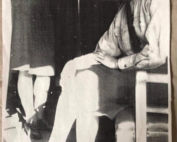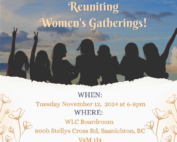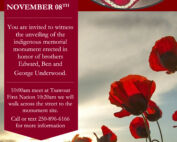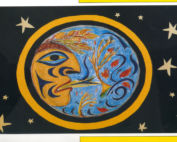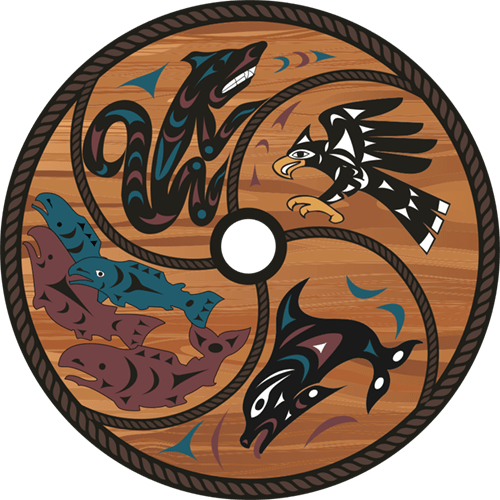Read the transcript below to learn more about Ethan and the impactful work he’ll be doing with the Indigenous Management Board.

Interviewer: Can you tell me a bit about who you are and where you’re from?
My name is Ethan Cire, and I am Cree-Métis man, born and raised on Treaty 6 territory, what is currently known as Alberta. I grew up in a very small town called Ponoka. I enjoyed the time that I was raised there, it was really great. I’ve always had a large connection to my parents’ heritage. My mom is Cree, and my father is Hungarian and Slovakian. So I’ve got a mix-match of everything in there.
Even though I was born and raised in Alberta, I’m happy to be here on the island now. My wife and I moved here three years ago when she received a work opportunity, she’s an optometrist. We thought, “Why not? When else are we going to go?”. So that’s how we came out this way, and we really love the island. The beauty of the land and the nature around us is amazing. So we’re very happy to be here now.
Interviewer: What kind of work will you be doing with the W̱SÁNEĆ Leadership Council?
I’m still very new to the position, so I’m still learning where I fall in the structure of everything. That being said, my time here so far has been great. I’ll be working as the Communications Coordinator and member of the Indigenous Management Board (IMB) Secretariat.
My position means being the main communications person who relays information about what we’re working on as the IMB Secretariat, in accordance with WLC and all of the 11 First Nations we’re working with. I am essentially one of the ‘point people’ who will relay information to member Nations so that they know about all the new things surrounding marine conservation on their lands.
Now, I’m focusing on learning what information needs to be out there and the best forms that the information should take.
Interviewer: Can you share some of the background and experience you bring to this position?
I’m quite new to communications. I’m hoping to get a Master’s degree in communications eventually, but I wanted to gain more experience within the field first. I saw this position and decided that it was time to try and go for something that would be a career driving force: a position at an organization.
My background is an Honours Bachelor of Arts Degree in Film with a major in Film and a minor in English. I’ve always enjoyed dabbling in and studying these forms of visual and literacy communication. Now, I’m utilizing that background in film editing and content creation, which should be very valued in this new position because making communications accessible to everybody is crucial. In terms of past positions, I worked at Wilfrid Laurier University in Ontario while I was studying there. I worked there as a Peer Academic Coach and The Indigenous Student Center Liaison. So, I’ve always had Indigeneity around me as a force that motivates me to keep working for our people.
So that’s where most of my background comes from. Like I said, I’m quite new, but thankfully, the people at the IMB have been very patient with me and are allowing me to really get my bearings. Outside of that, I held a previous position at a bouldering gym for climbing. So coming here was a huge change. But it now allows me to want to go bouldering after I’m done in the office, which is great.
Interviewer: What kind of impact do you hope to have during your time with the WLC & IMB?
I hope to make all of the WLC’s communications more inclusive, accessible and straightforward. People often don’t love the digital side of things like emails, documents, and information sharing on numerous web sources. For example, an elder might find watching a quick video easier. My plan is to readjust and figure out the best way to get information out to specific Nations.
In addition, I’d like to create open dialogue conversations. What I mean by that is the chance to see something, take in the information, digest it all, think about it, and not just have an immediate reaction. It’s more about sitting down and having that thought process around what we’re trying to achieve, which is bringing forward these ideas and new notions to the BC government and the Canadian government, that would allow these 11 First Nations to work towards something together. So, if I can make it easier for everybody within those Nations and the WLC to understand these things and relate to them, then I’m doing my job. That’s what I’m hoping to do – utilize newer modern technology and content creation as a way to share things while adjusting those things to whatever the preferences would be for the Nations.
Interviewer: What do you like to do when you’re not at work?
The main thing right now would be bouldering or any type of climbing. I hope to accomplish a little more outdoor climbing this year. I also enjoy hiking, especially with the weather changing now here on the island. It’s wonderful seeing the sunshine and rays coming down, it really makes you want to get out there and do anything and everything outside. I also like going for runs and going for bike rides with my wife. We have two dogs as well, so taking them out and playing with them on the beach is one thing I love to do. I come from inland, so I’m very drawn to the ocean. It’s wonderful to go down to the ocean to read or just listen to the waves.
Besides that, as I mentioned before, with my arts degree, I’m very obsessed with anything and everything related to film, especially in the areas related to production, background, writing, and direction. As of late, we’ve also been reading a lot and getting back into the habit of sitting down with a book and enjoying time.
Interviewer: Is there anything else you’d like community members to know?
I’m here to listen, and I’m here to learn. I have respect for all living things in nature, and I’m doing this work with the force of all of my Indigenous relations behind me. If community members know that, then hopefully that will reflect to them that I take this position very seriously. I don’t want to ever make anyone feel as though they are unheard because that’s something that Indigenous people and BIPOC have always struggled with. So, as a Communications Coordinator, that’s my job. I just want them to know that I’m here for strictly that and to keep that open dialogue.


